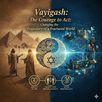Winning Only 54%: What Federer Teaches Us About Jewish Resilience
- Rabbi Yosef Vogel

- Apr 11, 2025
- 2 min read

In his commencement address at Dartmouth College, Roger Federer offered a most compelling insight:
“In the 1,526 singles matches I played in my career, I won almost 80% of those matches. But what percentage of points did I win? Only 54%. In other words, even top-ranked tennis players win barely more than half the points they play.”
What makes a champion is the ability to let go of the past in order to fully commit - with total focus and clarity - to the present.
As a People, we burst onto the world stage with the Exodus from Egyptian tyranny.
From birth, the Jewish people were endowed with a divine gift: the power to transcend all external and internal forces that seek to suppress the free expression of our divine spirit.
The Exodus from Egypt is an ongoing story, and each of us plays a vital role as it continues to unfold.
We have been beaten many times, “in every generation”, yet we rise again, because we transcend those who seek to crush our free and independent mindset.
We refuse to see ourselves as victims. We are not intimidated by those hate us. Our identity is not shaped by how others see us.
As Jews, we can only experience true freedom if we know who we are. Pride in our identity is impossible without a deep understanding of it. When we lose hold of our own narrative, we become vulnerable to those who seek to undermine us.
The central theme of Passover is this: “Tell the story to your children.” It is the greatest story ever told - history interwoven with timeless values that have shaped civilization itself. It has inspired world religions followed by the majority of humanity.
As a people chosen to be a “light unto the nations,” we must not be defensive about our historic role.
It’s been said that it’s easier to take the Jew out of exile than to take the exile out of the Jew.
But as champions, we know this: to break out of a losing streak, we must fully commit - with total focus and clarity - to the next point.






Comments